Photo: Ebenezer Ofori Donkor (Kay Studios) for Burniton Music Group
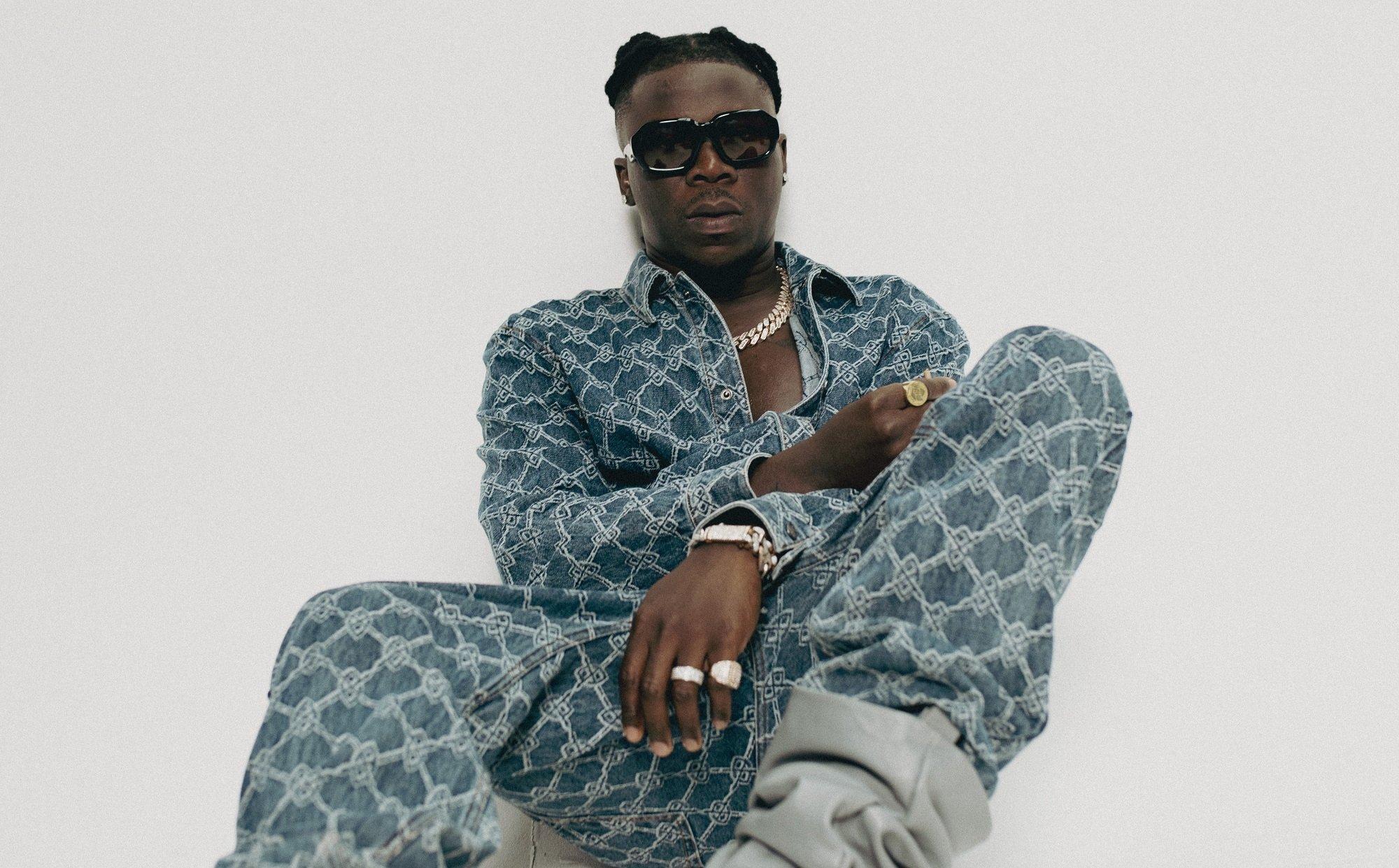
interview
Stonebwoy On His "Inner Quest" To Showcase Authentic Ghanaian Sound
"My vibration is well synced to music of Black origin," the Afro-dancehall artist says of his new album, 'UP & RUNNIN6.' "We are the custodians and we have to continue to bridge the gap by spreading the vibes."
Those perusing the history of Africa's entanglement with Jamaican sound can anticipate frequent mention of Stonebwoy's name. Throughout his career, the Ghanaian Afro-dancehall artist has connected sonic and cultural dots on a scale scarcely rivaled in Ghana’s music history.
Beginning with the release of his vibrant 2012 debut album Grade 1, Stonebwoy has meshed dancehall, reggae, Afropop, and hiplife with ease. Five studio albums, multiple collaborations and a growing number of accolades later, Stonebwoy is back with UP & RUNNIN6. Out Oct. 24, the album aims to turn back time, bringing audiences back to the "basics" of authentic Ghanaian and African sound.
"The nature and the mood of the album is going to give people authentic sounds from all the styles that I represent," the artist tells GRAMMY.com. "I just got drawn to selecting songs that give me that authentic feeling, and I realized that other people would love it too."
Stonebwoy's authenticity and lasting dedication to amplifying Africa through music has resonated with a global audience, as well as a number of major acts. His unmatched vitality has led to collaborations with fellow Afro-dancehall mainstays such as General Pype, Cynthia Morgan, and Patoranking, as well as Jamaican legends Beenie Man, Shaggy, and Sizzla. The release of Anloga Junction in 2020 marked a critical shift in Stonebwoy's career, projecting his story and signature sound to the world (while tying in international features such as Keri Hilson, Nasty C, Alicaì Harley, and Diamond Platnumz and Morgan Heritage). By 2023's The 5th Dimension, Stonebwoy was moving beyond his archetypal Afro-dancehall approach in favor of Afropop, amapiano, and Afro-R&B.
After much sonic exploration, UP & RUNNIN6 is a welcome return to roots that still feels as timely as ever. The album’s early singles reveal its vast range: "Pray for Me" is a reflective number featuring Wycelf Jean, while the buoyant "JEJEREJE" takes listeners to new heights.
GRAMMY.com spoke with Stonebwoy about connecting Africa and the Caribbean through music, Ghana’s #StopGalamseyNow protests, and the road to UP & RUNNIN6.
This interview has been edited for clarity.
Congrats on "JEJEREJE"! It’s been very well received both in Ghana and abroad. What tone did you want the track to set before the album officially drops?
I think the feeling has been that Ghanaians would love to hear some authentic Ghanaian style coupled up with today's sound. I realized that the people needed some nostalgic feeling, an authentic feeling. And we can use "JEJEREJE" as a very typical example of "African sound." This is what the world wants to listen to right now, especially Africans globally.
Tell us more about how you want to chanel authenticity through UP & RUNNIN6.
To cut a very long story short, this whole album is actually supposed to complement The 5th Dimension, which was more present and futuristic. UP & RUNNIN6 is also very present, but it taps into the original African sounds that a lot of people have been missing. I decided to tap into that energy to bring back some originality and remind us of the times before.
You’ve been in the game for over a decade now, and you’ve worked with a myriad of artists across five projects and countless singles. What do you want to convey with UP & RUNNIN6 that you feel you haven't yet shared with your audience?
I see life as a continuous process. From [my debut album in] 2012, there’s definitely going to be a build-up, so UP & RUNNIN6 is [a combination of] everything up till today. I’m still running with it. But I am making sure that I am creating music with a lot more reasoning in terms of satisfaction, and with an intense sankofa [a Twi word and phrase that connotes learning from the past to inform the future] kind of mentality.
For me, my vibration is well synced to music of Black origin. Therefore, I have the liberty to latch on to whatever vibration that is inspiring the world and inspiring me too. I merge both to stay true to my roots. That is what UP & RUNNIN6 is about for me.
Let’s talk about the feature selection on this album, because it seems very particular. In addition to the big names like Wyclef, Spice, and Duncan Mighty, you heavily represent rising talents from across the Caribbean and Africa such as Kaylan Arnold, Blvck H3ro, and Larruso. Were you intentional about platforming emerging voices on this project?
I’m just paying attention to an inner quest of moving in the UP & RUNNIN6 direction, without necessarily looking at the technicalities. I am moving with a vibrational understanding, but I'm just realizing now what meaning I'm making on a technical level.
I have two songs that have more than two features: "Geography" and "Overlord." These are the two songs that speak to my Caribbean Afro dance style, and they also open a platform for other people to get up and run.
I'm happy because Blvck H3ro just hit me up recently and said, "Yo bro, thanks for putting me on the album." I'm like, "Why not?" Kaylan is on the album too, and you know Chi Chi Ching has also been around for some time. But the variety and the uniqueness that they all carry is incredible.
A consistent thread throughout your project — and your entire career — has been your dedication to connecting Ghana and Africa with Jamaica and the Caribbean. How do you think African artists can use their platforms and their music to foster greater interconnectivity with the diaspora?
I think it's just by continuing what we’ve been doing already. I think Africa has always been very receptive of its people from the diaspora. I have been very intentional about it ever since I [learned] that there are other Black people spread across [the globe]. And as soon as I realized that they all must have a link, or must have come from Africa, I had a lot of interest in wanting to capture that wide range in my creativity.
That was a turning point for me, where I realized that I cannot be doing music while only considering Ghana or people on the African continent. I must capture the globe. My music is not only for Africans at home, but also for Africans abroad and in the diaspora. This has been my inspiration from the get-go. That's why I have always pushed the style that I do.
I'm grateful that I am well-accepted in the Jamaican and Caribbean society in terms of my representation of Black people globally. I think over the years, I've been able to develop my craft so that it appeals to the diaspora. That's one of the ways that I will continue to — and other artists can continue to — bridge the gap. We are the custodians and we have to continue to bridge the gap by spreading the vibes.
A significant part of your work also includes uplifting Africa and advocating for its liberation through music. As you’re well aware, there were recently protests in Ghana against galamsey, or illegal gold mining, a phenomenon which is progressively contaminating the country’s bodies of water. This is an issue you’ve spoken out against in the past with your 2021 single "Greedy Men." What is the role of the artist in advocating for the liberation of their fellow citizens?
Whatever happens in Ghana or Nigeria or Kenya or South Africa — so long as it's happening on the continent of Africa — Africans can relate. And so long as something is happening on the continent, then the world can relate.
Illegal mining is not the only big headache that is hitting Ghana, you know. And I believe that there are surely forms of illegal mining of different natural mineral resources across Africa. For instance, Congo has a lot going on in that regard as well, where foreign companies are killing people while they dig for minerals.
There is a tendency to underrate Ghana's contributions to contemporary African music as we tend to focus on the music scenes that are most validated by the West. But what are some key elements we’re missing about Ghana's role in the spread of African music and the development of its larger soundscape?
Ghana cannot be stripped of its contributions in the overall establishment of African sound and its globalization. Ghana can never be written off. Ghana will forever remain that very important contributor to the explosion, globalization, and the creation of African sound.
But Ghana has the responsibility of amplifying its own contributions. Because if you do not amplify your own contributions, you can't expect Nigeria to amplify Ghana's contributions as much as they amplify their own contributions. Who is actually going to invest their resources — be it human, be it capital — to amplify somebody else’s contributions? The only responsibility we owe each other is just a level of honesty.
A very critical example is today’s amapiano in Nigeria. Someone who doesn’t know wouldn’t be able to speak to the fact that it is amapiano that influenced the addition of certain elements in today’s Afrobeats.
Learn more: Amapiano's Decade-Long Journey To Global Dominance: The Sound Redefining Club Music Worldwide
That’s why I'm proud to go anywhere and mention Ghana. And to read and study and know that E.T. Mensah is the founding father of highlife music, these are the legendary bands, this is where they went to, and this is how big they were. The contributions that our forefathers and predecessors made are left in books to be read and in history journals to be dug out. Or else, someone will just say what they think, and that will become what we know today.
If you see African music as a building, don’t forget that the foundation must be strong for it to get to where it is today. In as much as the roofing can be seen clearly, you cannot easily see the foundation that is in the soil. So it is up to us to be honest enough. The guy that’s on the roof should say, "That’s my brother down there that's holding me up right now." We just have to be selfless enough and honest enough. I don’t think there’s too much wahala [trouble] in that regard.
Our differences should be the advantages that we have, rather than them becoming the weaknesses that we use against each other. So Ghana plays some of the most significant moments that have changed the landscape forever. That might not be sitting on top as the roof to be seen, but it is sitting right in the soil as a foundation to remain forever.
You’ve recently signed a new deal with Warner's ADA Worldwide. What are your hopes for the new partnership?
My target for this partnership is to continue to send my music across the globe the right way, through the right channels.
One of the things that we lack in our systems in Africa is monetization, and being able to gather all the necessary valuables that come with music as a commercial commodity. I think it's important to partner with certain institutions that are very well established globally to be able to see the end results of our music. And also, to propel our artistry to the next level.
Watch Stonebwoy Rise To The Top In This Bold Performance Of "Manodzi" | Global Spin
It goes without saying you’re incredibly accomplished. Over the past decade, you’ve indelibly shaped Ghanaian and African music. How would you summarize the legacy that you’ve left, and what do you look towards for the future?
While you are running the race, you know that you have to hit the end mark, but it is only after you hit it that you can sit back and analyze how your race went. Using that as a scenario, I trust that there's more mileage for me to hit. But so far, so great. There's a lot that has gone on, that is going on, and I'm grateful for that.
It just gives me energy to keep going because I do not feel that I have finished. There are things that can still be done, in terms of shows, still taking over, still pushing the numbers.
For the future, I see myself having an established system that can continue to harness and develop more musicians, equipping them with access that they didn’t have before. The best example I can use is Jay-Z — who’s an artist and an entrepreneur and is still very active.
We have to build back a better system in order to continue to produce musicians. This is what I see on a large scale when it comes to the music aspect of my life.
More News About African Music
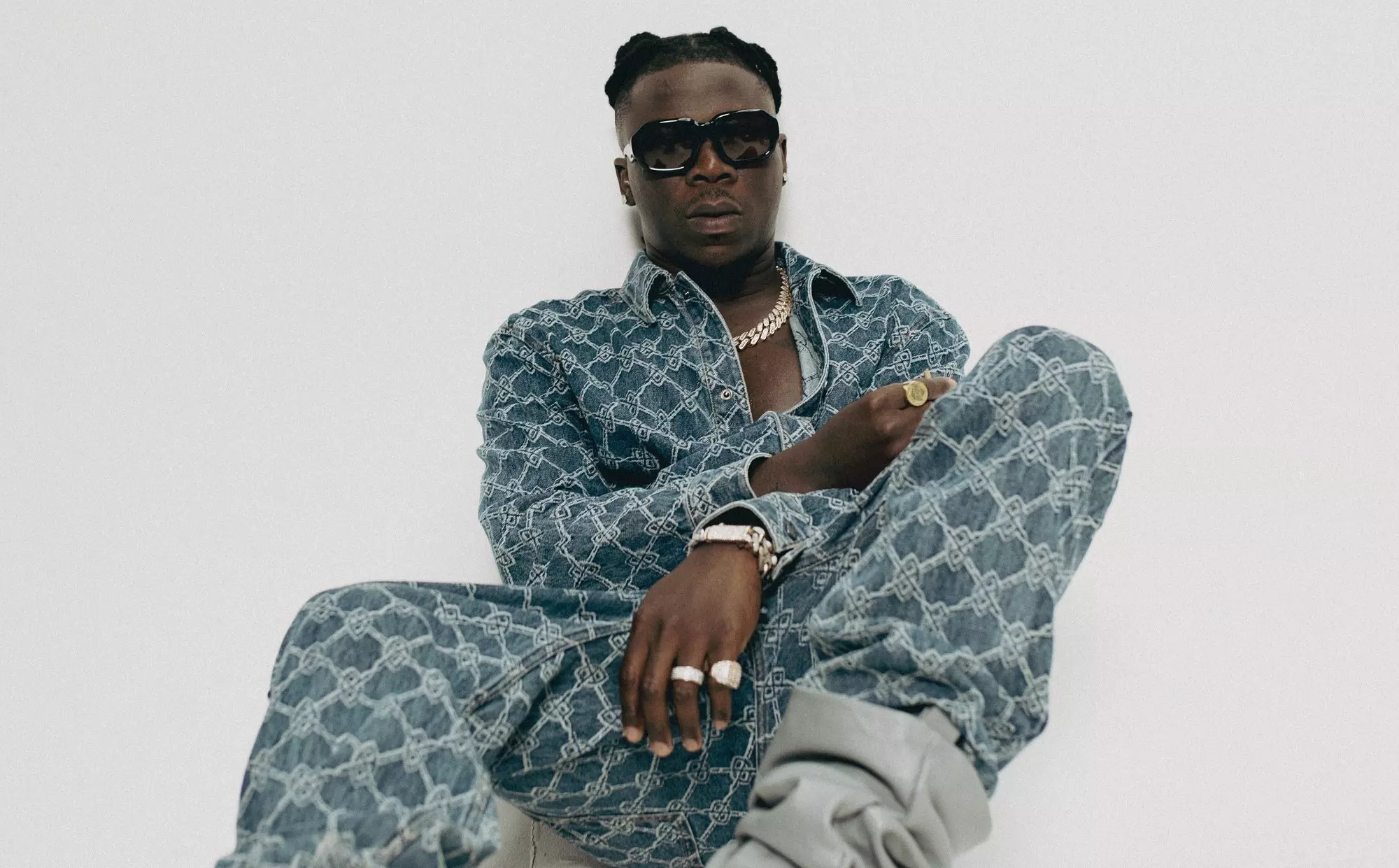
Stonebwoy On His "Inner Quest" To Showcase Authentic Ghanaian Sound

Mic Monsta Performs "Local Lokito" | Global Spin
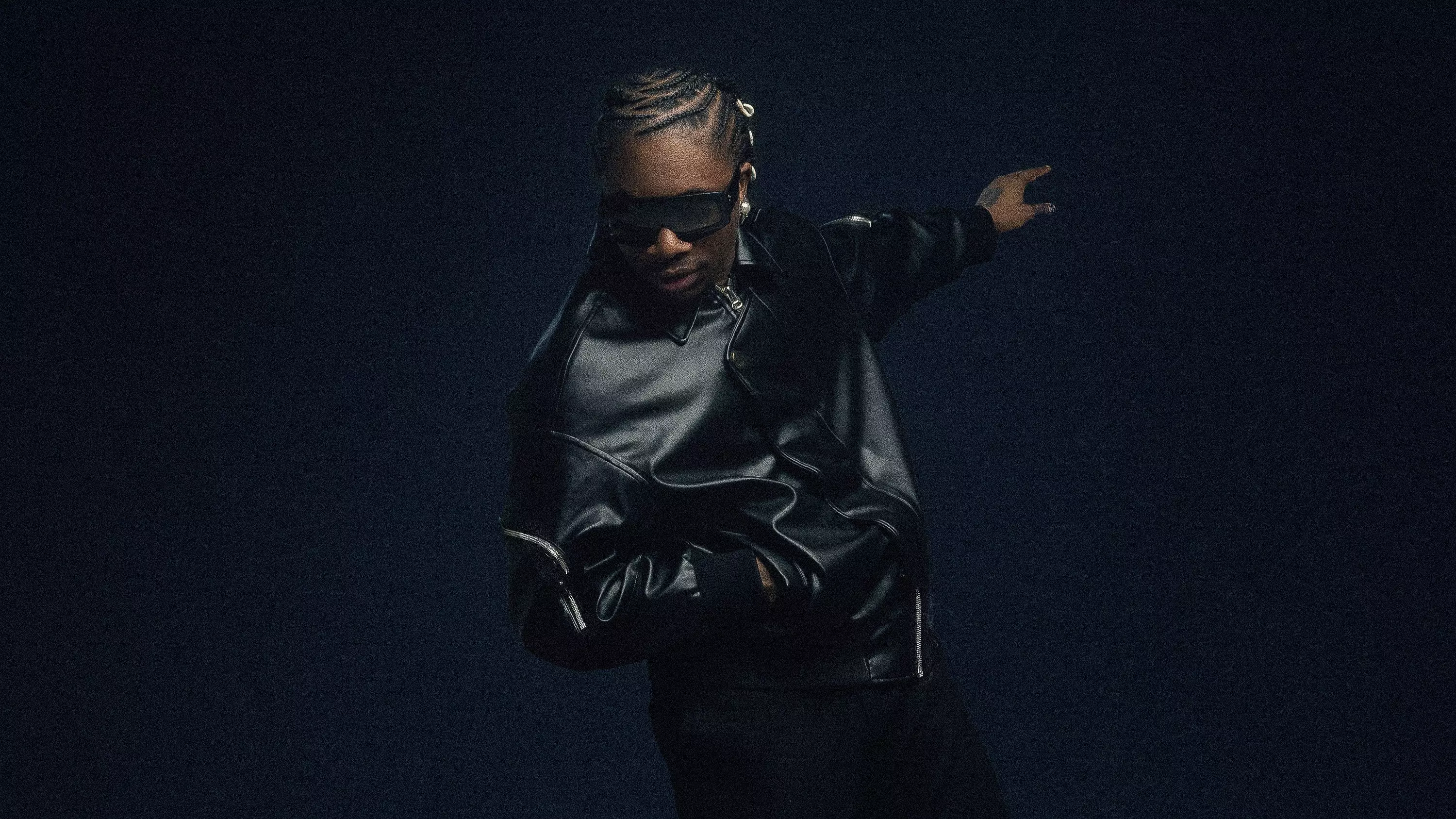
Rising Afrobeats Star Oxlade Is Ready To Go Global On 'Oxlade From Africa'
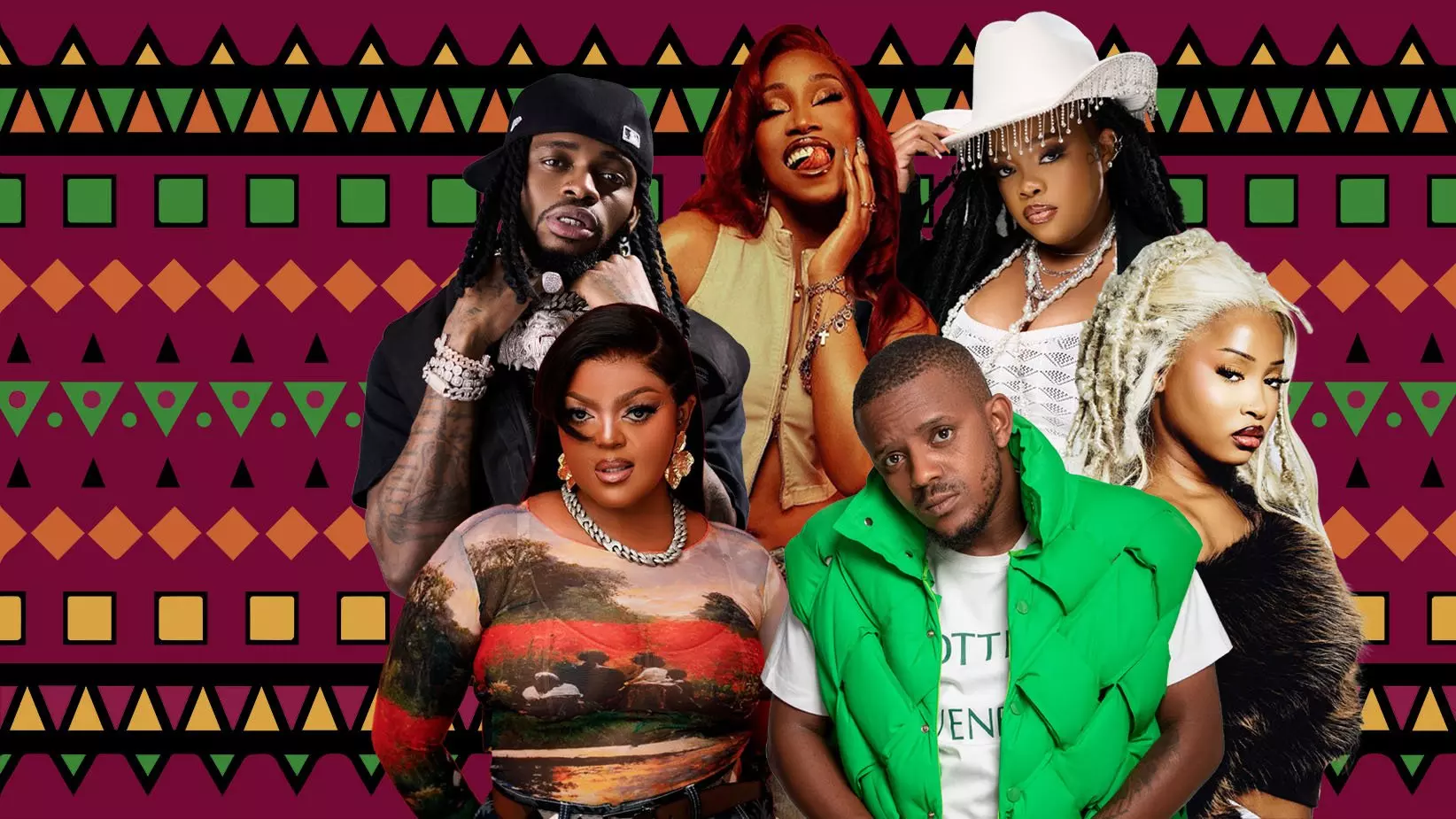
Amapiano's Decade-Long Journey To Global Dominance: The Sound Redefining Club Music Worldwide
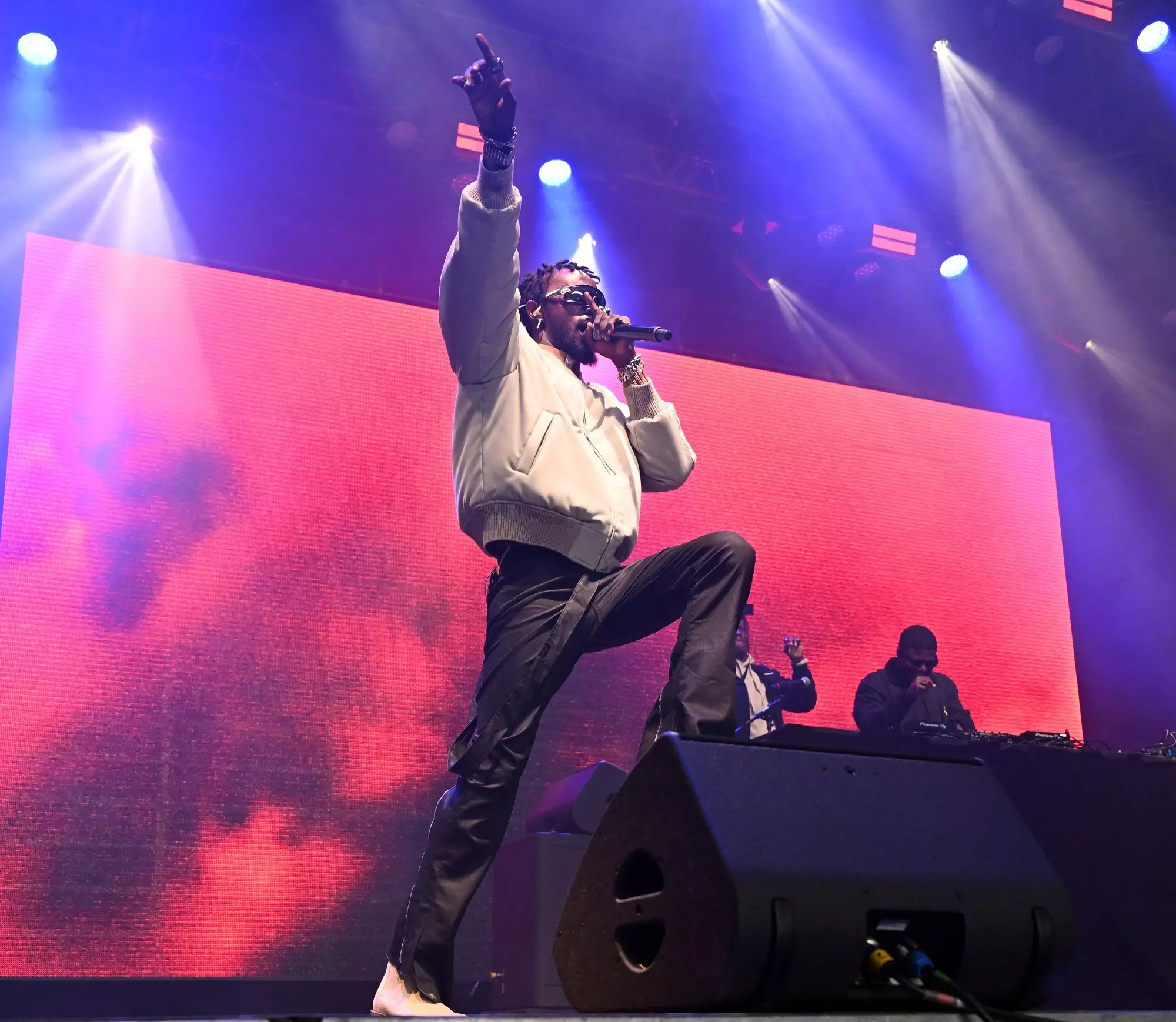
10 Artists Essential To Ghanaian Hiplife: Reggie Rockstone, Sarkodie, Mzbel & More
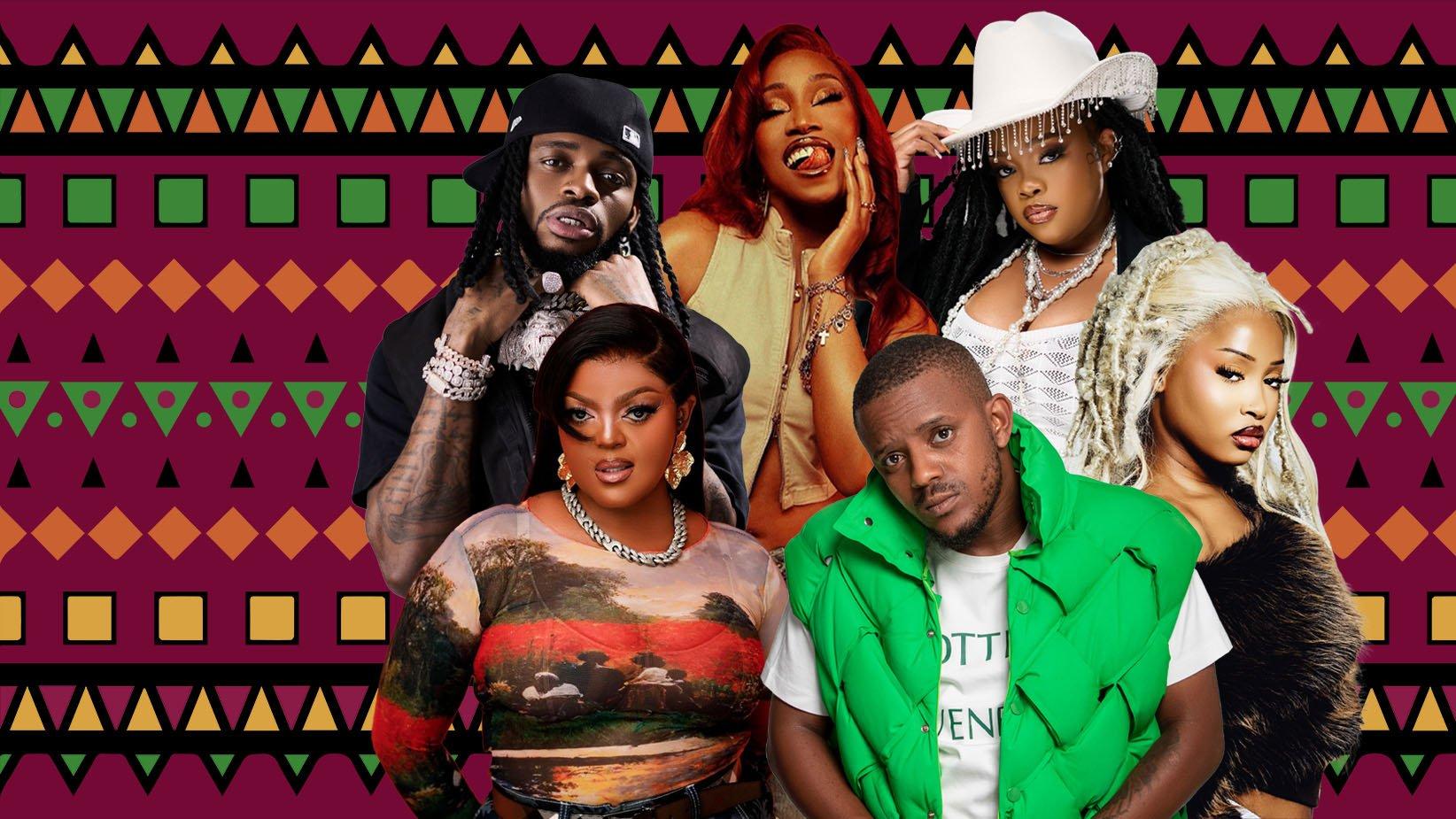
Photos: Blaq; Jibril Jallow; Malwandla Rikhotso; Mishaal Gangaram; Malwandla Rikhotso; Minenhle Nene
feature
Amapiano's Decade-Long Journey To Global Dominance: The Sound Redefining Club Music Worldwide
Amapiano may have started in the townships of South Africa, but it didn’t stay there. Amapiano artists Kabza De Small, Uncle Waffles, DBN Gogo, and others detail how the genre went from the underground to the GRAMMY stage and beyond.
At nightclubs in Tokyo, New York and beyond, pulsing through the speakers at major European music festivals, and even in Hollywood blockbusters, one sound has been steadily taking over: amapiano.
The South African genre, with a blend of deep house, jazz, lounge and local musical styles, has captivated the world, generating billions of views on social media and sparking a cultural phenomenon that shows no signs of slowing down. On TikTok alone, the #Amapiano hashtag has amassed over 10 billion views, a testament to its global reach and popularity.
Characterized by velvety, hypnotic grooves, piano melodies, deep basslines, and smooth percussive rhythms, amapiano was born in the townships of Gauteng Province — particularly in cities like Pretoria and Johannesburg — in the mid-2010s. Slower than the average club track, amapiano songs often live between 110 and 120 bpm. The genre's rise to global dominance is a testament to the power of grassroots creativity and digital connectivity.
Fast-forward to February 2024, and South African singer Tyla took home the inaugural golden gramophone for Best African Music Performance at the 2024 GRAMMYs. Beyond Music's Biggest Night, Tyla's amapiano-infused Afropop hit "Water" topped the Billboard U.S. Afrobeats Songs and Hip-Hop/R&B charts, and became the first African song to enter the Billboard Hot 100 since 1968. The "Water" dance challenge on TikTok — created by Tyla’s choreographer, Litchi — also widely pushed the song.
Tyla isn't alone in pushing the genre's popularity. Interest in amapiano has been propelled by social media and streaming platforms. According to Spotify data, the genre garnered its first 100 million streams in 2020; by mid-2024 the platform reported 855 million streams of amapiano songs. Between 2014 and 2024, there has been a 153 percent growth in international exposure to the genre.
While Tyla’s win at the GRAMMYs and in wider culture affirms the genre’s solid footing in the global music scene, amapiano’s popularity is the result of a decade-long journey.
The Birth Of A Movement
While the birth of amapiano is generally pegged to 2014, there’s no specific event or single person that can be credited with its uprising. Amapiano's origins were humble but innovative, distinguished by its inclusivity and collaboration — factors that are likely the result of the fluidity with which the genre emerged.
Young, aspiring producers in South African townships used affordable personal computers and free music production software to blend globally-influenced sounds such as deep house and jazz with kwaito — a distinctly South African genre. True to the collaborative nature of the genre's origins, an amapiano song can have six to 10 collaborators (sometimes more); the result is a blend of carefully curated voices, notes, and themes that captivates listeners far beyond its birthplace.
Kabza De Small began his career in 2009 and broke through on the continent with his 2016 album Avenue Sounds. Today, he's hailed as the "King of Amapiano" by media, fans and industry peers. "Amapiano is considered a raw, rough sound. To see people globally dancing and participating in TikTok challenges is thrilling," he tells GRAMMY.com, reflecting on amapiano's unique sound and present-day virality.
This rawness is largely reflected in the genre’s production, which often strips down tracks to their bare essentials. Repetitive beats and bass often contribute to amapiano's "rough" aspect, making it feel more direct and visceral. Soulful melodies float over that heavy bass and percussion, and catchy vocal hooks balance the raw beats underneath.
Amapiano’s collaborative nature has been crucial to its development. Kabza De Small shouts out pioneering producer, singer and songwriter, Mdu aka TRP. "Not a lot of people know that he basically founded the log drum sound that is so essential and distinct" to amapiano, De Small says. In amapiano, the "log drum" isn't an actual instrument but a distinct, synthesized bass sound that captures the deep, resonant tones of a traditional log drum. This signature sound has become a cornerstone of amapiano's unique and captivating vibe.
From Local Phenomenon To National Breakthrough
Cultural authenticity has been a key factor in the sound's appeal. It's not just a genre of music, but a representation of South African identity and expression. The name itself came from the Zulu language, which is the word for "pianos."
By 2016, amapiano was still finding its ground, with local DJs and producers refining its signature elements.
Learn more: 11 Women Pushing Amapiano To Global Heights: Uncle Waffles, Nkosazana Daughter, & More
A significant milestone was achieved in 2017 when De Mogul SA's "Oe Batla Kae" became one of the first amapiano tracks to achieve commercial success. The tune got the artist booked for local shows, effectively paving the way for other amapiano songs. In 2018, "Umshove" by Kabza De Small feat. Leehleza showcased a more refined amapiano sound, highlighting elements that "Oe Batla Kae" lacked — particularly the log drum.
2019 was a defining year for amapiano, as songs like "Labantwana Ama Uber" by Semi Tee (feat. Kammu Dee and Miano), "Vula Vala" by DJ Maphorisa and Kabza De Small (feat. Nokwazi and Vigro Deep), and "Kokota Piano" by Kaygee Daking and Bizizi further left the underground. Amapiano could be heard on television and radio, in clubs, and across social media, effectively making the above songs anthems throughout South Africa.
As the sound began to spread nationally, it carried with it the stories, language, and rhythms of its birthplace, creating a strong connection with listeners across the country.
The Global Takeover
As the world grappled with COVID-related lockdowns in 2020 and 2021, danceable amapiano songs such as DBN Gogo and Musa Keys' "Possible," Focalistic's "Ke Star" feat. Vigro Deep, and "Emcimbini" by Kabza De Small and others provided a much-needed escape. With more time spent online during the pandemic, the genre was simultaneously making its way into social media globally, with a variety of TikTok dance challenges bringing additional listeners to the genre.
International collaborations further catapulted amapiano onto the world stage. In 2022, Nigerian crooner CKay collaborated with Davido and Focalistic on "Watawi", a notably huge Afropiano song. On YouTube, the songs performed quite well, with "Woza" by South African artists Mr JazziQ, Kabza De Small and Lady Du featuring Boohle hitting 21 million views. "Mang’Dakiwe" by DJ Obza featuring Leon Lee hit 17 million views. The remix, done in collaboration with Tanzanian bongo artist Harmonize garnered 29 million views.
By 2023, the amapiano sound was now mature and definitive, with all of its key elements together. Over the next few years, amapiano sounds would be incorporated with genres from other countries to great effect.
Zimbabwean amapiano vocalist Sha Sha's "Tender Love" feat. DJ Maphorisa and Kabza De Small garnered more than 15 million views on YouTube. The popular release showcased her impeccable vocal range and denoted that amapiano was now being done by artists beyond South Africa. For her efforts, Sha Sha took home the Viewer’s Choice Best New International Act award at the 2020 BET Awards. Her win on an international platform signaled amapiano's arrival on the global music scene and opened doors for more artists to gain international exposure.
Simultaneously, awards for and documentation of amapiano within South Africa pushed the movement even further. In 2021, the South Africa Amapiano Music Awards were launched and exclusively dedicated to the genre. The inaugural Best Amapiano Album Of The Year Award was given to De Mthuda for Ace of Spades.
Uncle Waffles, whose electrifying DJ sets have made her a symbol of the genre's youthful exuberance, marvels at this global embrace. "It's amazing to see the world embrace a new sound," she tells GRAMMY.com. "Seeing people dancing and singing to the songs never fails to stun me."
Amapiano artists including Uncle Waffles, DBN Gogo, and Major League Djz have performed on a variety of global stages, from AfroNation's Portugal and Miami events to Coachella and London's O2 Arena. Tyla has performed at the BET Awards, the 2024 Olympics and the Cannes Lions Festival 2024.
Encouraging Cross-Cultural Collaborations
Amapiano has become a cultural ambassador, allowing artists in the diaspora to connect with their roots while introducing the sound to new audiences.
Amapiano singer Nqobilé Danseur, who grew up in South Africa before moving to the UK at age 12, tells GRAMMY.com that "amapiano is deeply personal to me as it embodies my South African heritage and journey. Growing up in South Africa, kwaito was the soundtrack to our lives."
The genre's authentic DNA has allowed artists to explore new territories, both geographically and creatively. Nqobilé recounted her 2022 single "Shake" featuring Xavier being played during a carnival party in New York, and how the crowd's engagement reflected amapiano's ability to transcend cultural and physical boundaries.
Singer/songwriter Boohle, who transitioned from gospel and Afropop to amapiano, has toured Dubai, Amsterdam, and many African countries. "Seeing cultures and backgrounds unite over the music we make is something else. I would call it God's plan," she tells GRAMMY.com.
This international appeal has seen the rise of crossover subgenres such as Afropiano (Nigeria), bongopiano (Tanzania), Gqom 2.0 (South Africa), and bique (Mozambique). Afropiano tracks have garnered hundreds of millions of views on YouTube as of 2024. Among the largest hits are Kizz Daniel and Tekno's "Buga," Spyro's "Who is Your Guy" remix feat. Tiwa Savage, and "Unavailable" by Davido feat. Musa Keys.
Diamond Platnumz, a Tanzanian bongo artist, is a prolific contributor to the amapiano genre. "Tanzania has a very close relationship with South Africa from years back established with our forefathers," he says, adding that he also has family in South Africa. "I spend a lot of time there between business and family obligations. It was a natural thing for me as a creative to infuse what I was hearing on the ground in SA with what we are accustomed to in Tanzania."
Platnumz's amapiano catalog is impressive, with songs such as "Iyo", "Shu!", and "Nitongoze." He has collaborated with the genre’s heavyweights including rapper Focalistic, choir Mapara A Jazz, and the late Costa Tich. His 2024 amapiano single "Komasava" remix is an international collaboration that featured Khalil Harrison, Chley, and Jason Derulo.
The track, rich in amapiano beats, layered with modern pop elements, and Zulu, Xhosa, French and Swahili lyrics, exemplifies how the genre has become a bridge between artists from different parts of the world.
Cultural Impact Beyond Music
As amapiano spread globally, it began to influence fashion, dance, and broader culture.
The genre's success has also opened doors for African artists to venture into arenas outside of performing music. Kabza De Small created PianoHub, a record label which houses South African amapiano artists including Young Stunna, Mdu aka TRP, Nkulee & Skroef28, Deeper Phil, Masterpiece TVK, and Stakev. De Small added that he plans to open a venue called Piano Hub Soweto — another example of how amapiano has created economic opportunities and fostered community development.
DBN Gogo echoes this sentiment, adding that amapiano has broadened the horizons for many in the industry. "Outside of music, I think my team and I have been grateful for the opportunity to travel and see the world," she says. "Whenever we do have the opportunity we take time in different countries to immerse ourselves in the dance culture there. Amapiano has done so much in giving us and many others the chance to represent South Africa and the genre worldwide."
The success of amapiano has boosted Nqobilé Danseur's confidence, affirming her authenticity and driving her to release music consistently. Diamond Platnumz adds that he has become more aware through his involvement with amapiano, making his life's purpose even more meaningful. This July, DBN Gogo became the first amapiano DJ to perform at Belgium's Tomorrowland festival.
Even Beyoncé has taken notice: Uncle Waffles' debut single "Tanzania" was featured during a dance break on the European leg of the Renaissance World Tour.
Looking To The Future
As amapiano enters its second decade, its influence shows no signs of waning. The genre continues to evolve, with artists experimenting with new sounds and collaborations that push its boundaries.
Going forward, listeners can expect to see amapiano artists continuing to team up with global stars, experimenting with sounds that cross genre boundaries, from Afrobeats to electronic dance.
In October 2023, DBN Gogo collaborated with veteran Italian EDM DJ and producer Benny Benassi on a track titled "SAdesFakSHen." In June 2024, Chris Brown released "Hmmm," an Afropiano song featuring Davido. The song, which is part of his 11:11 album now has over 14 million views on YouTube by the time of this publication. Previously, Chris Brown appeared on the "Monalisa" remix, an Afropiano hit by Nigerian singer Lojay and producer Sarz.
"Tshwala Bam" by TitoM and Yuppe is another 2024 amapiano hit that saw Burna Boy jump on a remix. The song spawned a massive TikTok challenge, which got Tyla dancing with famed streamer Kai Cenat, while Khabi Lame joined in on the challenge, and Jason Derulo collaborated with popular twins Laurent and Larry Bourgeois on the dance.
Despite its success, amapiano faces challenges as it continues to grow. Maintaining its cultural authenticity while appealing to a global audience is a delicate balance. There's also the question of how to ensure that the pioneers and grassroots creators of the genre continue to benefit from its global success.
Boohle envisions a bright future for the genre. "Seeing the world jamming to amapiano is a dream come true for me as a young musician in South Africa," she says. "Remember, we come from a background of apartheid and oppression. Seeing cultures and backgrounds unite over the music we make is something else."
The story of amapiano is still being written, with each new release, collaboration, and dance challenge adding a new chapter to this remarkable musical journey. As it continues to evolve and inspire, one thing is certain: The amapiano revolution is far from over – it's just getting started.
Latest News & Exclusive Videos
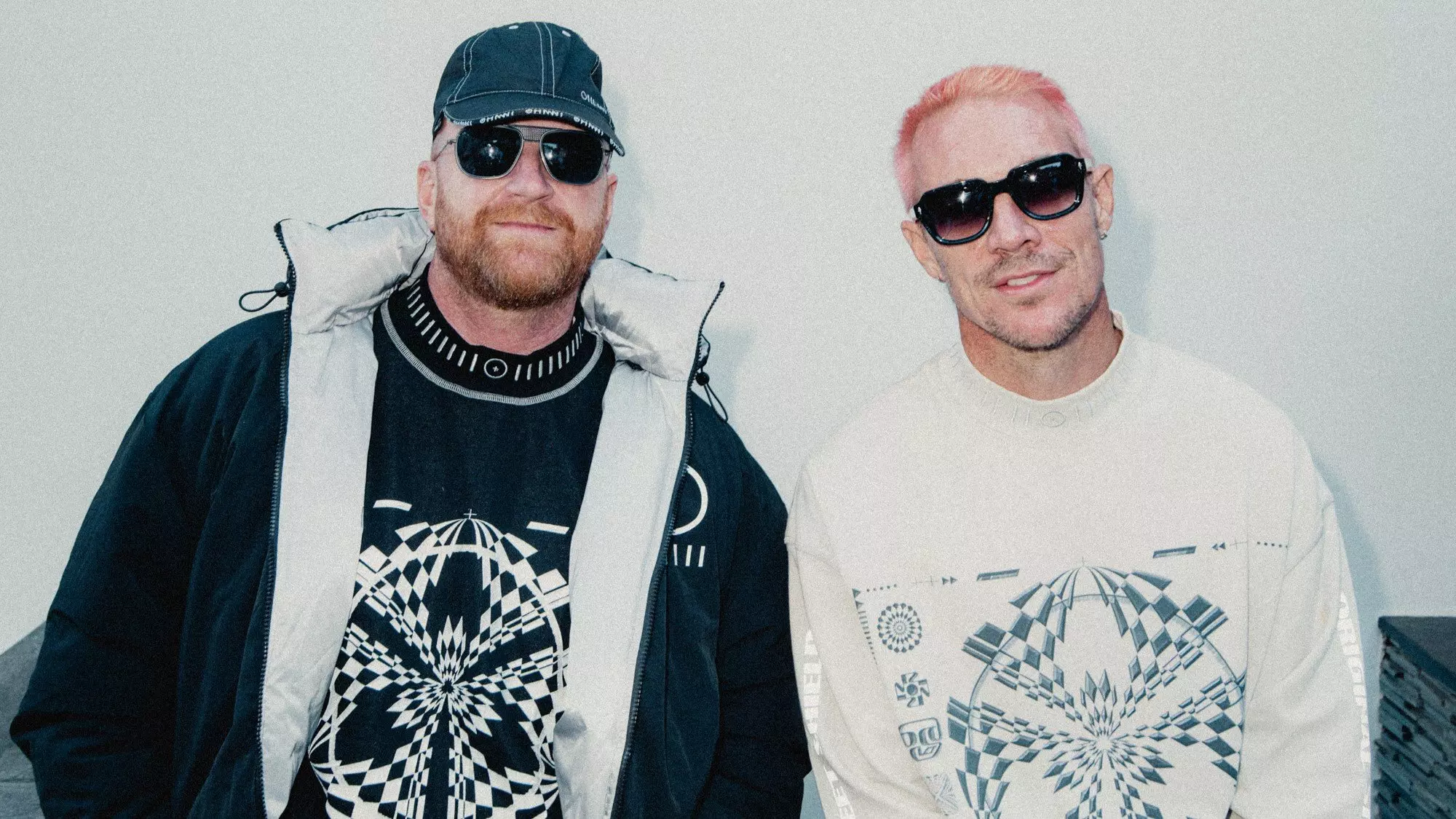
How Major Lazer's 'Guns Don't Kill People…Lazers Do' Brought Dancehall To The Global Dance Floor

YOASOBI Performs "Idol" | Global Spin
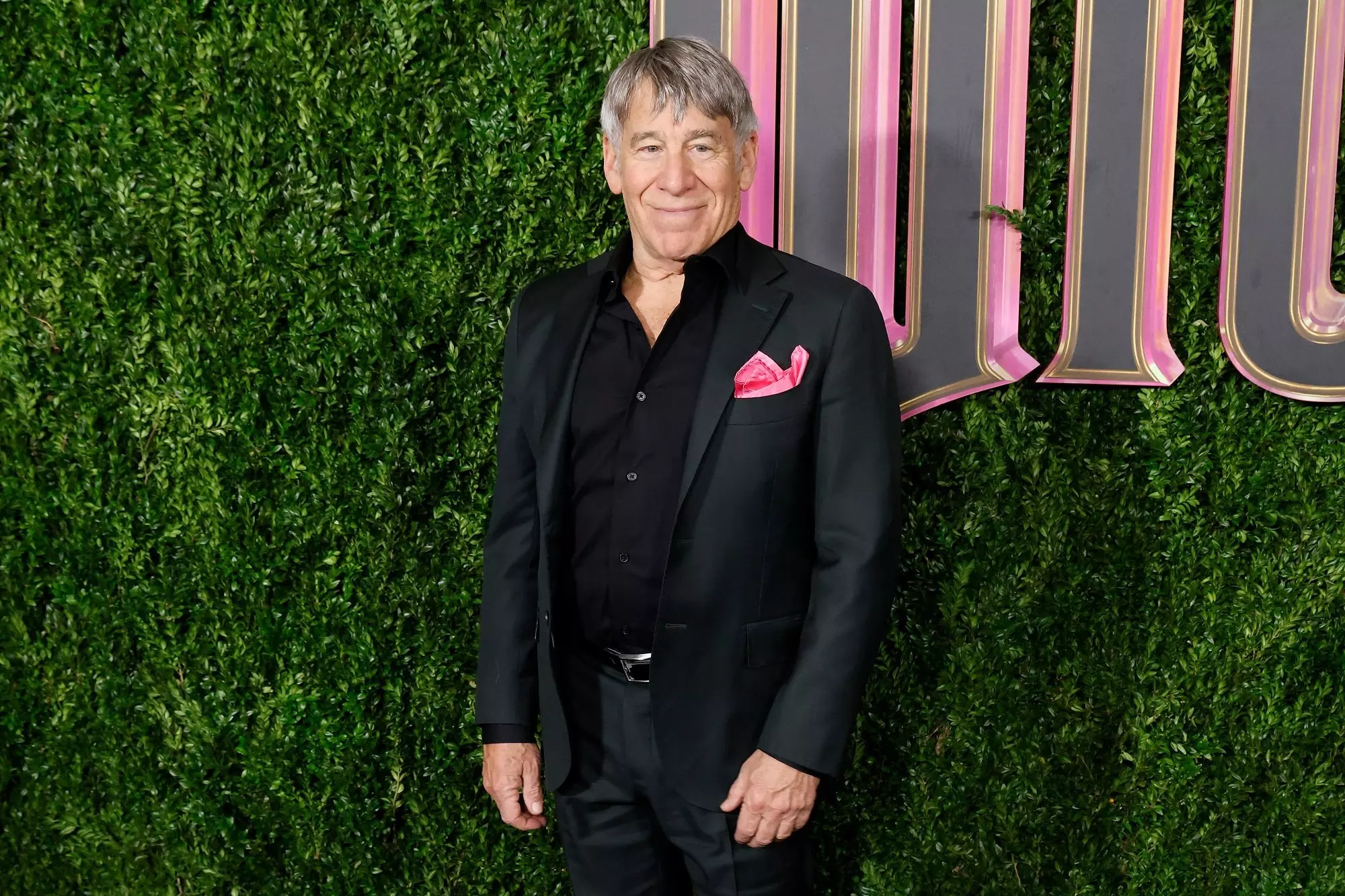
'Wicked' Composer Stephen Schwartz Details His Journey Down The Yellow Brick Road
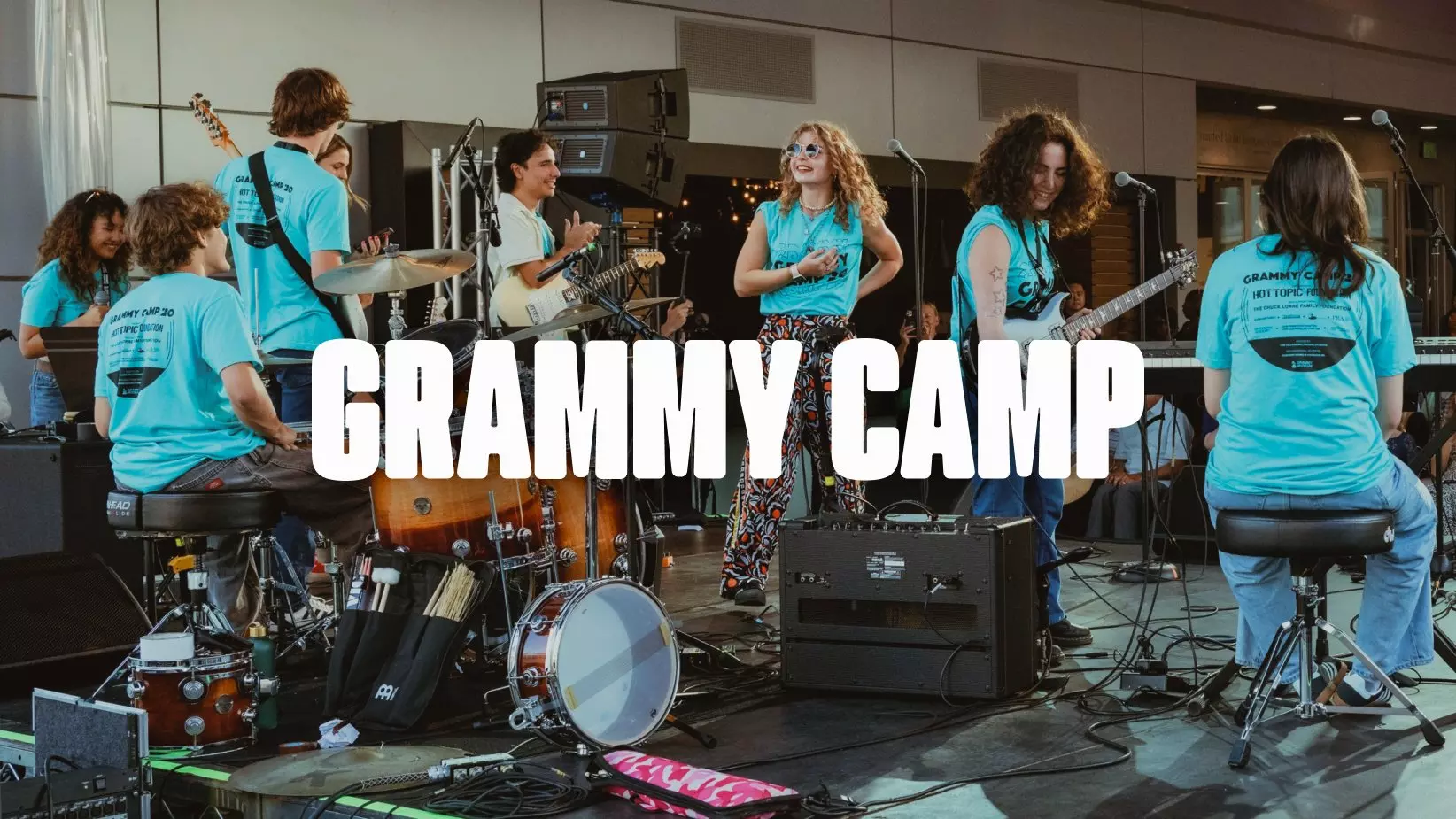
GRAMMY Museum Expands GRAMMY Camp To New York & Miami For Summer 2025
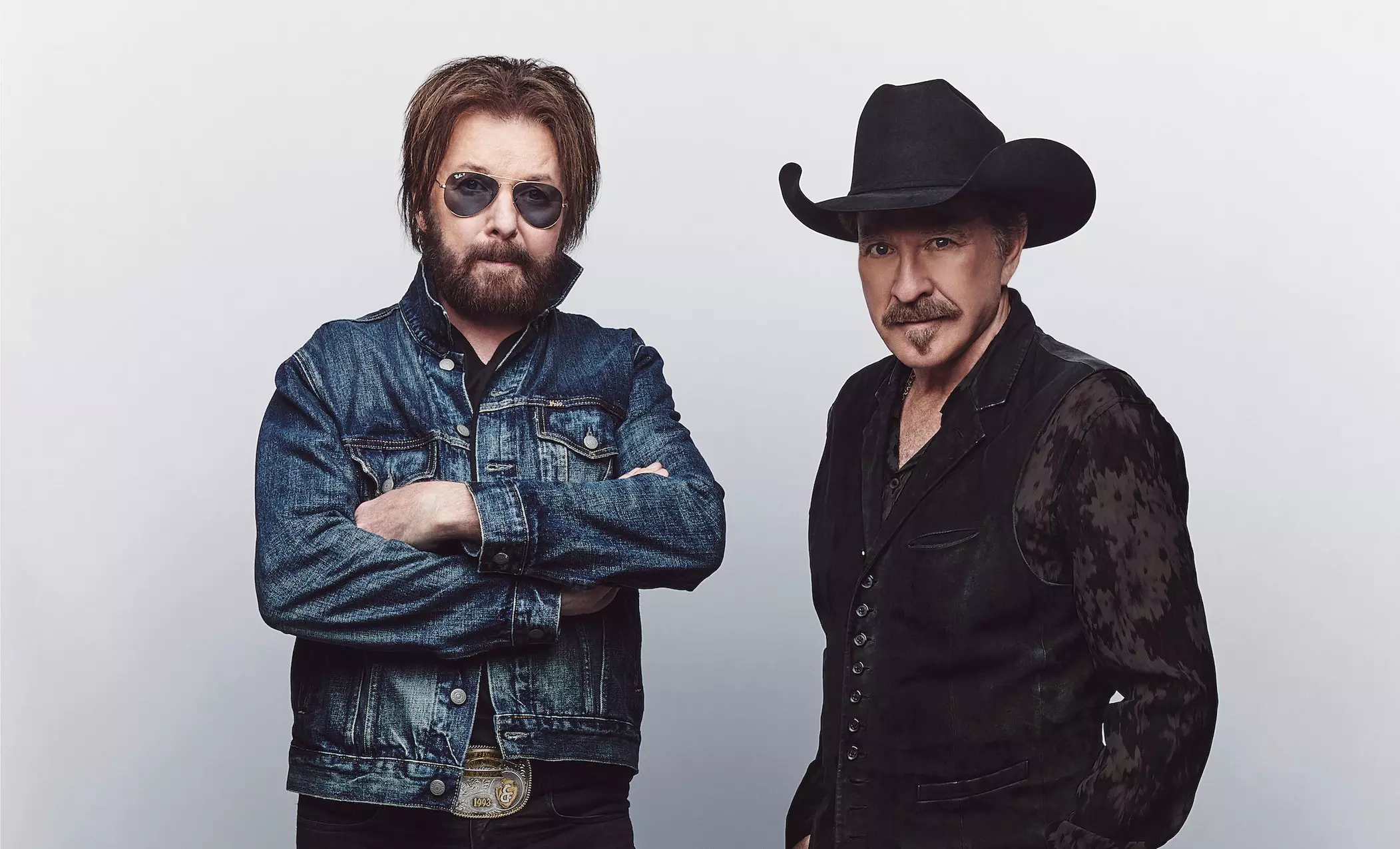
Living Legends: Brooks & Dunn On How 'Reboot II' Is A Continuation Of "Winging It From Day One"
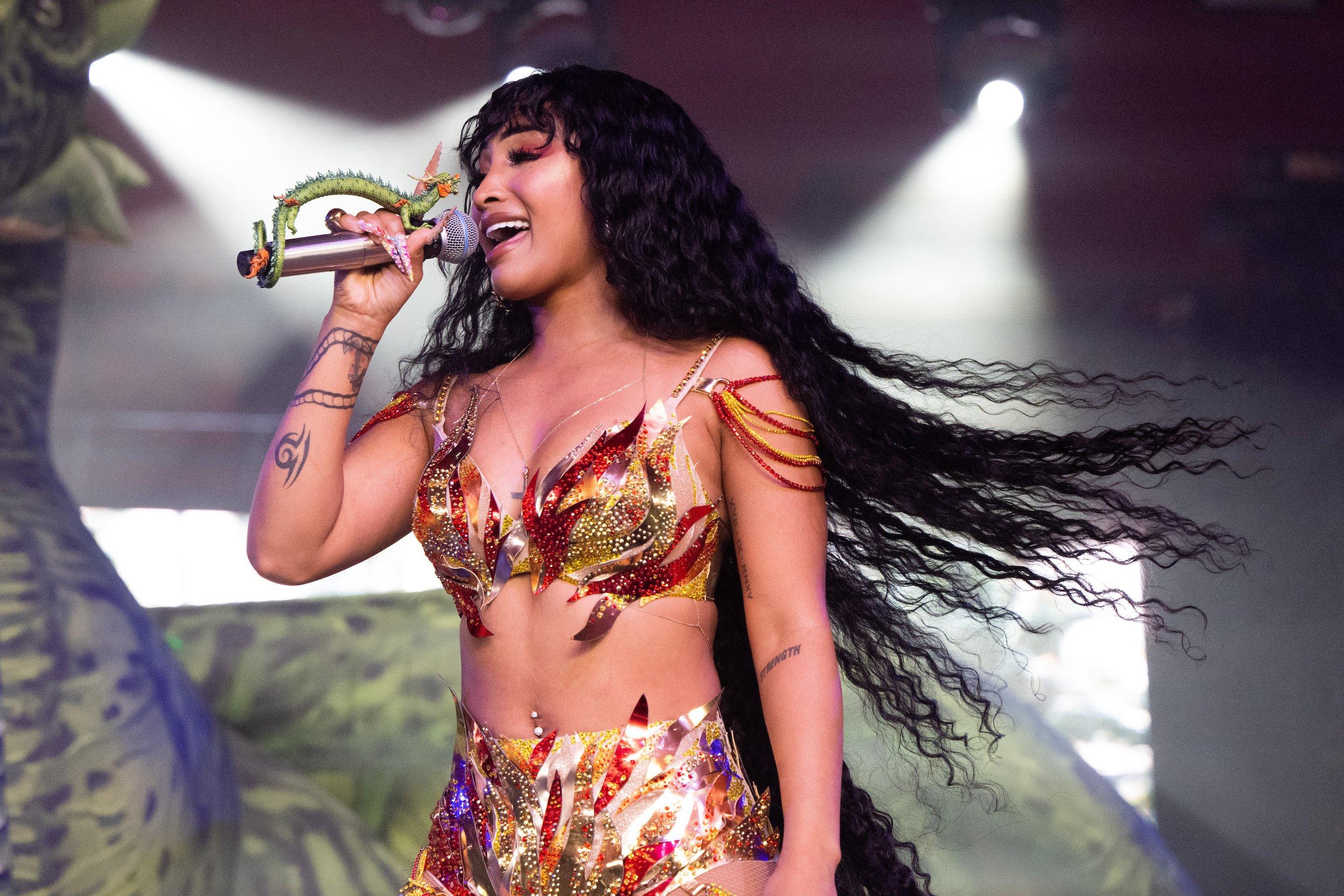
Photo: Scott Dudelson/Getty Images for Coachella
list
8 Can't-Miss Acts At Afro Nation Detroit 2024: Shenseea, Ayra Starr, Kizz Daniel & More
After a successful first year, Afro Nation Detroit returns to Bedrock's Douglass Site on Aug. 17 and 18. Get to know some of performers who are sure to be weekend highlights, from Uncle Waffles to Scorpion Kings.
Since its inception in 2019, Afro Nation has brought together the world's best and brightest entertainers in Afrobeats, amapiano, R&B, and hip-hop to perform on stages across the world. For the second year in a row, the festival takes over Bedrock's Douglass Site in Detroit — promising to continue its tradition of highlighting the best in Black music.
With its unique Detroit location, the festival bridges the gap between African music, global Black music, and the rich musical traditions that came out of Motown. In fact, the festival's site was once home to the first federally funded housing project for Black citizens in the city; Diana Ross and Smokey Robinson were among its residents.
Afro Nation Detroit offers as much history as it does global appeal, as its lineup is filled with buzzy rising stars and beloved veteran acts. Among those on the star-studded roster are Nigerian sensations Omah Lay, Rema and Asake, amapiano stars Kelvin Momo and TxC, and hitmakers Lil Wayne and PartyNextDoor.
Of course, it wouldn't be a Detroit event without native rapper Kash Doll, who performs on Saturday. And she won't be the only Detroiter performing over the weekend: genre-bending soul singer Charity and DJ Donavan Glover will also be repping their city amid sounds from around the globe.
That's just a taste of the exciting performances scheduled to showcase the diversity of Black music in one of its influential cities. Below, get to know eight acts who you won't want to miss at the second edition of Afro Nation Detroit.
Ayra Starr
Sat., Aug. 17 (Lit Stage)
At the age of 22, Ayra Starr is already making history. In February, The Beninese-Nigerian singer was the youngest nominee in the inaugural Best African Music Performance Category at the 2024 GRAMMYs; and in June, her debut album, The Year I Turned 21 helped her become the first female Nigerian artist to debut on the Billboard 200 album chart.
Just before her Afro Nation appearance, Starr added another first to her resume: she became the first Afrobeats singer to be part of Amazon Music's Breakthrough Artist program. The honor aligned with the release of her Amazon Music documentary, Dare to Dream, which chronicles her rise to global fame. There's no doubt that Ayra Starr will offer a showstopping performance that proves why she's such an acclaimed artist to watch.
Uncle Waffles
Sat., Aug. 17 (Piano People Stage)
Often regarded as the "princess of amapiano," Uncle Waffles is one of the genre's most forward-facing talents. In less than five years, the internationally recognized DJ/producer has been listed on TikTok's inaugural Visionary Voices Africa List, been nominated at the BET Awards and MOBO Awards; this year, she became the first amapiano artist to perform at Coachella.
Her talents have also earned Uncle Waffles co-sign from Beyoncé — whose Renaissance World Tour homage to Uncle Waffles' "Tanzania" nearly brought the star to tears — Drake, Ciara, and Missy Elliott. Needless to say, Uncle Waffles is an act that you won't want to miss at AfroNation Detroit.
Read More: 11 Women Pushing Amapiano To Global Heights: Uncle Waffles, Nkosazana Daughter, & More
2woBunnies
Sat., Aug. 17 (Piano People Stage)
Think Daft Punk, but amapiano. Masked South African DJ duo 2woBunnies decided on the concept of anonymity as a way to create intrigue about their unique take on the genre, and let their music do the rest.
Though it has only been two years since their debut, they have done just that, from garnering more than 1 million likes on TikTok to performing sets everywhere from Dubai to Australia. Following first-time performances in major cities like Paris and Toronto, they'll make their Detroit debut next — and you don't want to miss the excitement they'll bring to Afro Nation.
Kizz Daniel
Sat., Aug. 17 (Lit Stage)
Since releasing his breakout single, "Woju," in 2015, Kizz Daniel has been a trailblazer in bringing Afrobeats to the world. And nearly 10 years in, he's continuing to deliver songs that resonate — including a hit remix of "Twe Twe" with fellow Nigerian star Davido.
Kizz Daniel's Afro Nation performance comes on the heels of another fiery remix, as he recently hopped on Nigerian artist Kaestyle's "My Dealer." He'll have plenty of new songs from his own catalog to bring to his set, too, including his latest single, "Double,” and EP TZA. Whether new or old, Kizz Daniel will be ready to give his crowd a lesson in Afrobeats.
Shenseea
Sun., Aug. 18 (Lit Stage)
In May, Shenseea released her sophomore studio album, Never Gets Late Here, which solidified the GRAMMY nominee as one of Jamaica's most promising rising stars. "Hit & Run", the album's single, was warmly received throughout the Caribbean, reaching No. 1 on several charts across Antigua and Barbuda, Turks and Caicos, Bermuda, Barbados, Trinidad and Tobago, and many other countries in the region.
Fittingly, Shenseea first brought Never Gets Late Here to life on stages across the Caribbean, where her onstage energy matched the hyped crowds. She stops by Afro Nation Detroit just after kicking off her Never Gets Late Here North American Tour in Chicago on Aug. 16, so she'll surely be ready to show festgoers why she's so beloved in her home country and beyond.
Amaarae
Sun., Aug. 18 (Lit Stage)
To say Amaarae is in demand would be an understatement. Sabrina Carpenter personally requested the Ghanaian American artist as an opening act for her forthcoming tour; Childish Gambino featured her on his new album, Bando Stone & the New World, and its accompanying tour; and she recently made history as the first Ghanaian artist to perform on NPR's Tiny Desk.
Her latest release, roses are red, tears are blue — A Fountain Baby Extended Play, are equal parts Afropop and alté, a fusion genre that originated in West Africa and combines hip-hop, R&B and Afrobeats. Her sweet, alluring nature signifies her place as one of the most exciting new talents to take over pop. Don't miss the opportunity to see a new global pop girl take center stage.
Scorpion Kings
Sun., Aug. 18 (Piano People Stage)
DJ Maphorisa and Kabza De Small — often referred to as the "godfathers" of amapiano — are the men behind Scorpion Kings. Already established in their own right and respected in South Africa's dance scene, the two have been inextricably linked to the global rise of the genre, and the celebration of South African and African music across the globe.
Last month, the pair performed alongside the who's who in amapiano — Kelvin Momo, Oskido, DJ Tunez, DJ Moma, Aquite, and the Descendants — in Central Park, making history as the first amapiano performance in the famed New York landmark. The duo is sure to keep the party going with their signature flair in Detroit.
DJ Moma
Sun., Aug. 18 (Piano People Stage)
There is a good chance that you know of DJ Moma. In addition to being one of the founding members of Everyday People, the Sudanese American DJ has been playing African music in venues throughout the country and world for over a decade.
His blend of African and Diasporic music, and incorporation of soca, amapiano, and dancehall are a celebration of everything that is global Black music. It is more than music to him, but a way to bring Diasporic musical traditions to the forefront, in an effort to connect and unify People of the African Diaspora across the globe. His mission will make for an Afro Nation Detroit moment that is as meaningful as it is joyful — a combination that's exactly what the fest is all about.
More News About African Music

Stonebwoy On His "Inner Quest" To Showcase Authentic Ghanaian Sound

Mic Monsta Performs "Local Lokito" | Global Spin

Rising Afrobeats Star Oxlade Is Ready To Go Global On 'Oxlade From Africa'

Amapiano's Decade-Long Journey To Global Dominance: The Sound Redefining Club Music Worldwide

10 Artists Essential To Ghanaian Hiplife: Reggie Rockstone, Sarkodie, Mzbel & More
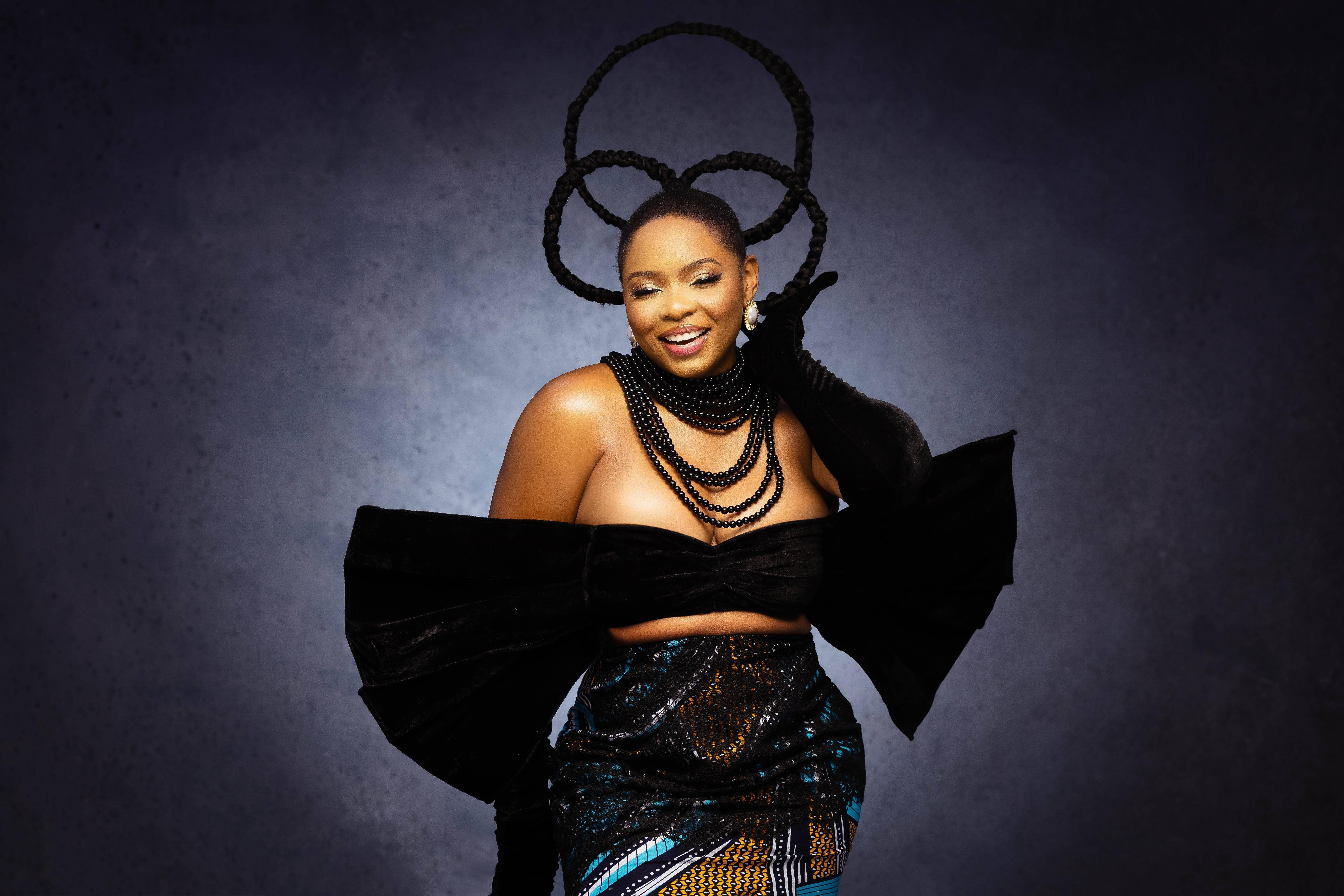
Photo: Emmanuel Oyeleke
interview
Afropop Legend Yemi Alade On New Album, 'Rebel Queen,' Historic Hits, & Working With Beyoncé
Ahead of the release of her latest album, 'Rebel Queen,' Yemi Alade discussed her career over the last decade and what it meant to work with Beyoncé. "That lady has really touched my life in a way that I will never forget"
Before Afrobeats icons Burna Boy, WizKid, and Tyla became globally recognized household names, Yemi Alade was the continent’s biggest pop star. On July 26, she will release her sixth studio album, Rebel Queen, which expands her repertoire with a world of adventurous pop sounds.
The Nigerian singer/songwriter burst onto the African pop music scene in 2014 with "Johnny," a now-classic tune that gained acclaim by its iconic video featuring a TV news reporter tracking the titular womanizer. The video made her the first Nigerian female artist to hit 100 million views on YouTube.
Since then, Alade has had an illustrious career, collaborating with artists including Rick Ross, earning another 100 million-view video for "Oh My Gosh," and featuring alongside fellow Africans Mr. Eazi and Tekno on the Beyoncé-curated soundtrack for The Lion King.
Her latest album, Rebel Queen, includes high-profile collaborations with Angélique Kidjo, Ziggy Marley, and dancehall star Konshens. The album promises a genre-jumping journey across the globe, incorporating amapiano ("Soweto to Ibiza"), highlife ("Chairman"), and even reggae ("Peace and Love") and dancehall ("Bop’).
Ahead of Rebel Queen’s release, GRAMMY.com caught up with Alade about her progression as an artist, what it was like to work with Beyoncé and her team, and bridging international success.
This interview has been edited for clarity and length.
Your new album, 'Rebel Queen', contains influences from all over Africa and beyond. Was that intentional?
Yes, you're correct that I wanted to make sure that the album had sounds that I actually genuinely love, from the amapiano influence to dancehall. And also, I personally wanted to go back to the foundation of Afrobeats, which are sounds and genres that I listened to growing up as a kid. When my parents took me to family parties, there were certain melodies and guitar strums that I fell in love with. And I wanted to revisit those nostalgic moments and put it all in this album.
There are a lot of high-profile collaborations on this record, such as Anjélique Kidjo and Ziggy Marley. How did you decide who to work with on 'Rebel Queen'?
Honestly my life is a roller coaster, same for every touring artist. We try to gather as much as we can while being in motion. Anjélique Kidjo is like my music mum, I love her. And when I made the record, "African Woman," who else would I feature on such a song if not Anjélique? And as for Ziggy, he and I have a song that we did previously ("Look Who’s Dancing Now"), which was his song, and he featured me. And I wanted a tit-for-tat moment. So I sent the song to him. I felt like, who else but him? Every feature was necessary to complete the melody for each song, they are such a huge part of each one, not just in the fresh vibe that they bring.
Learn more: Watch Yemi Alade's Enchanting Performance Of "Tomorrow" | Global Spin
It’s been ten years since you broke out with the massive hit "Johnny." Back then, African pop music was relatively unknown in America. Since then, African artists have gained global recognition. Do you see yourself as a pioneer for the current Afropop movement?
I agree with you 100 percent, there is no way you authentically go through the history of, you know, building a bridge between Africa and the rest of the world via music without mentioning a song like "Johnny." It's definitely an honor for me to be the vessel that delivers such amazing music to the world. Of course, there were people way before me who also did the same thing. We're talking about Fela [Kuti]. We're talking about King Sunny Ade. At the end of the day, yes, music is metamorphosing into so much more. And definitely, I'm a pioneer [laughs].
You have a strong sense of storytelling, especially in your music videos. "Johnny" has an entire storyline about a news reporter investigating a womanizer. How important is that kind of storytelling to your music?
Storytelling is a big part of my artistry, because I feel everybody loves a good story. I find that even when I'm writing most times in the studio, there's always a picture I'm trying to paint, and it only makes sense for the visuals to kind of match that most of the time. Except sometimes we decide to make it a performance video because I just feel like dancing.
What’s the most memorable video you’ve ever done?
Every one of my videos has taken a lot of pain, sweat, and even some tears. But I think "Johnny" is such a masterpiece, because it resonated with the entire world, and Africa especially. And it pretty much helped me to stay on my way through the industry, because it became my identity. That song and that video was the platform for the brand and everything that I am today. you know, so that is definitely the most memorable, in a good way.
You've traveled to and performed in America several times in your career. What's your overall impression?
I think I've done four or five American tours. And yo, America is so big [laughs]. My first American tour had me in shambles, because of the flights. I didn't realize that to go from one city to another, I might have to connect once or twice depending on how far I'm going. So the flights had me in shambles, but the energy of the people? Oh my days, lit! America is definitely one of my favorite places. I’m always reminding my agents to make sure that they include American cities on my tours, which is why even for the album listening parties for Rebel Queen, we did the first one in Paris, then London, and then we had to come to New York as well. And then just yesterday, we had one in Lagos as well.
Since you first became popular, a lot of Afrobeats artists have gained a following abroad like Burna Boy and WizKid. It seems as though, at least looking at the artists that break outside of Africa, that the genre is still very male-dominated. Do you agree with that? And do you think there’s potential for more female artists to break out internationally?
Honestly, when I started out, the odds were really way more against women than they are right now, in that, there were female artists sprouting maybe once every two years, or once every year, and barely hanging around long enough. But now, the story is different. And I give kudos to all the women before me and all the women with me. Yes, in a male dominated society, it seems as though my male counterparts get their roses and their flowers for a second. And you know, once in a while someone comes back and remembers, "Oh, there's Yemi Alade." Do you know what I mean?
I was speaking to someone earlier today and I was saying, I think what surprises me the most is that, I feel like there are no expectations of female artists. So like, if we do or we don't, people are just moving on. But I'm not the one to play victim, never. Despite the odds, you see that the females continue to be resilient, because we know. I know deep within that my existence is definitely of value to so many people out there.
What do you think of the upcoming generation of talent like Tems and Ayra Starr and Tyla, who recently won the first GRAMMY Award for Best African Music Performance for "Water?"
Exceptional, exceptional artists. As you just mentioned, they're doing amazingly well. And, you know, these women are unique in their own ways. And I want to just say that I believe it's just the starting point for them. There's so much to come. And there's so many other females that are still en route to greatness.
How have you seen the music industry in Africa evolve? And what sorts of challenges do you think African musicians face today?
I personally feel like, with all the momentum that Afrobeats has got, we need authentic platforms that can actually check the streaming numbers that are coming in for music, especially within Africa. Because at the moment it’s mostly Apple, Spotify, etc. But there are other platforms here in Africa that most Africans use, and they have more of a database compared to Apple and Spotify. We've come to a point where we need to have more credible numbers, because there's millions of people streaming music in Africa that are not on those platforms.
So you think that these local platforms need to be counted alongside Apple and Spotify?
100 percent. In Nigeria there’s two: Audiomack and Boomplay. Boomplay is a big deal.
You’re going on a decade in the industry. In all that time, what's one moment or one achievement that gives you the greatest sense of accomplishment? What are you most proud of in your career?
That’s a big question…I think I have an idea, because there've been so many moments in my life and in my career that have aligned with my dreams coming true. Number one is each time that I'm approached by a complete stranger and the stranger tells me "Oh my God, Yemi. You don't know what your music has done for me. Your music has gotten me through so much grief." Some people walk up to me and tell me that they just had the biggest struggle in their life and they listen to my music, and it always sends them into a realm of joy and happiness. Honestly, I feel accomplished in those moments, because when I record my music, I always say, the thing I'm trying to spread through my music the most is love, joy and happiness. So to have people testify to that, it means to me that the magic is complete, that my job is actually effective. So that makes me feel very accomplished.
On a personal note, an accomplishment that I am most grateful to is the fact that I'm always able to comfortably take care of my family. It's something that I would never play down. You know, I'm just grateful to God for that.
And lastly, aside from winning a GRAMMY through Angelique Kidjo — you know, I've met a lot of amazing people, and Beyoncé is one of them. So at the end of the day, it's a full circle moment for me. I'm just enjoying the ride.
You know, it’s funny you mentioned Beyoncé, I was just about to ask you what it was like to work with her.
Oh my days — wow, working with her, it was such an experience for myself and my team. It was like, we're literally awake, walking in the dreams that we have dreamt for so long.The process of her team contacting us was a bit weird, because my management didn't realize that Parkwood [Entertainment] was a real company, that they were emailing them and talking about Beyoncé. They assumed that it was some kind of scam artist. But when they had sent it to me, I was like "What? Parkwood? Who doesn’t know Parkwood is Beyoncé?"
So it turned out that it was for real, and we went to L.A. where the studio was, and I lost my voice for 24 hours — I couldn’t talk, I couldn’t sing. I just soaked up all the vitamin C's and hot teas and Throat Coats I could get. I managed to regain a little bit of my voice back and that's what I was able to record that day. That was a miracle for me. But one of the most memorable moments was actually meeting her in person. After the album, Lion King, came out, the movie was being premiered in London, and I happened to be in London at that time. We had met her in person, we met Jay Z. It was such a full circle moment. Honestly, that lady has really touched my life in a way that I will never forget. Because she could have lived her life without doing what she did, but she decided to reach out to people she felt were pillars of African music and pay homage to Africa. And I'm happy to have been part of that moment.
More News About African Music

Stonebwoy On His "Inner Quest" To Showcase Authentic Ghanaian Sound

Mic Monsta Performs "Local Lokito" | Global Spin

Rising Afrobeats Star Oxlade Is Ready To Go Global On 'Oxlade From Africa'

Amapiano's Decade-Long Journey To Global Dominance: The Sound Redefining Club Music Worldwide

10 Artists Essential To Ghanaian Hiplife: Reggie Rockstone, Sarkodie, Mzbel & More
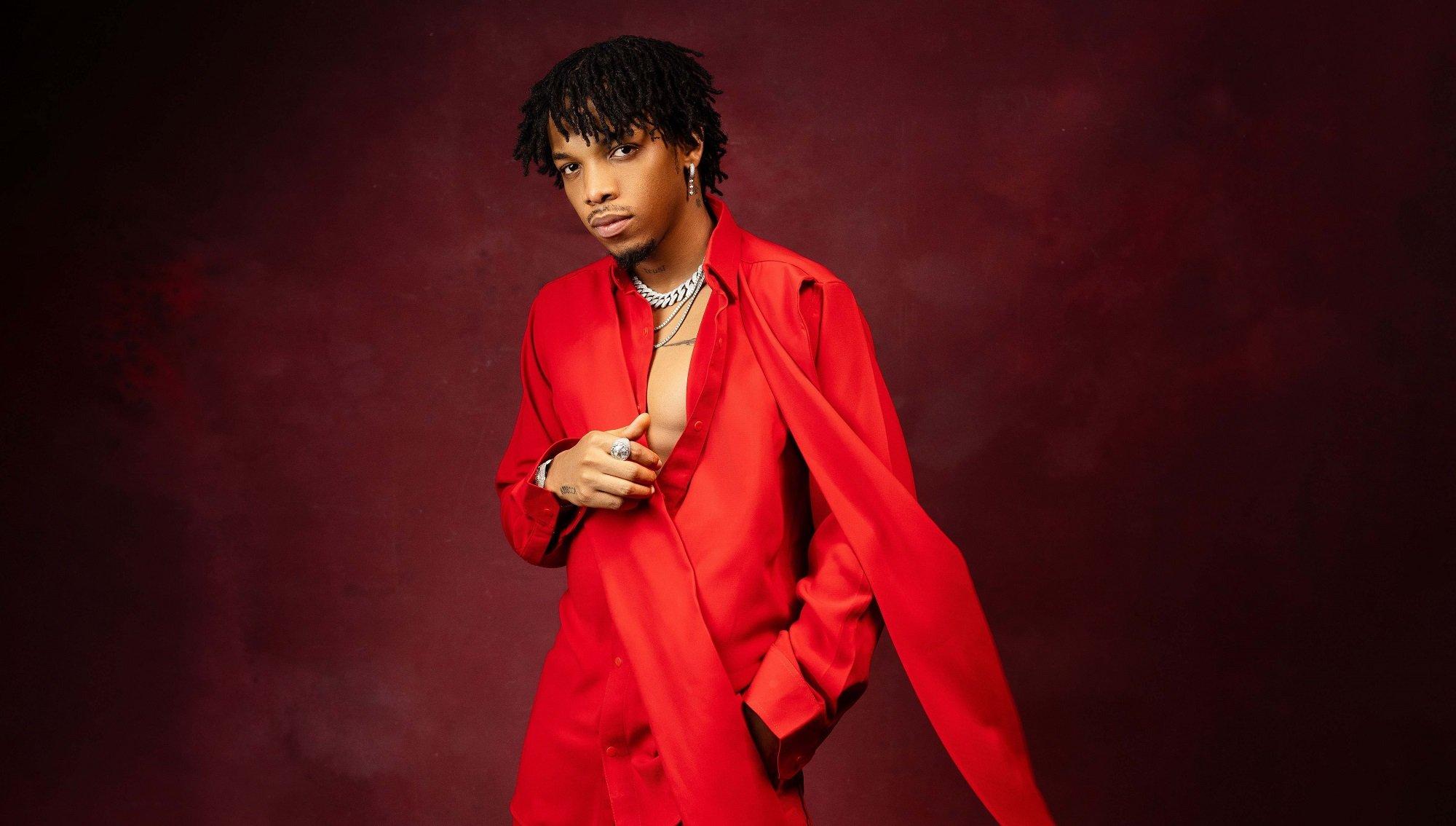
Photo: Emmanuel Oyeleke
interview
Tekno Talks New Music, Touring America & His "Elden Ring" Obsession
Ahead of his Back Outside tour, which hits the U.S. June 22, Nigerian artist Tekno details the origins of his name and sound, as well as his predictions for the future of African music on a global stage.
It takes a lot of guts to declare yourself the "King of Afro-pop," but Tekno has the hits to back it up.
The Nigerian artist is a staple of the country’s Afrobeats scene, responsible for massive hits such as "Pana" (over 66 million Spotify streams). He’s collaborated with massive artists across the world, starting in 2012 when he enlisted Davido for his breakout single "Holiday." He’s also entered the studio with the likes of Drake and Swae Lee, and Billie Eilish is a professed fan.
Despite this, Tekno hasn’t quite reached the levels of fame that colleagues WizKid and Burna Boy have stateside, but that may be about to change. He’s touring extensively across the U.S. this summer as part of his Back Outside Tour, supporting his 2023 album The More The Better. Tekno also recently inaugurated a label partnership with Mr. Eazi-owned emPawa Africa, defecting from SoundCloud.
The video for his latest single, "Wayo," features the artist as a cab driver going through relationship problems. It's a perfect example of Tekno’s classic pan-African pop, with romantic lyrics and a sweetly melodic sound.
GRAMMY.com caught up with Tekno ahead of his tour, which kicks off June 22 in Columbus, Ohio, to chat about his new music, career goals, and a surprising video game obsession.
You recently released a new single. Tell us a little bit about "Wayo?"
"Wayo" is basically me just tapping into my roots sound, the original pan-African Tekno sound. Our music has morphed and just grown into so many different sounds over the years. And it's very easy to forget that this sound existed before all this music that's playing right now. So I had to deep dive into that. That's basically how I describe "Wayo," I call it a basic Tekno love song. Like it's basically how I started really.
I don’t know if you’re aware that there’s an entire genre of music called "Techno?"
Yes, yes, it’s close to house music.
They’re pretty close. Actually, techno music was invented here in America by Black musicians in Detroit.
Oh, wow. Yeah, people don’t really listen to the techno genre out here yet. They prefer more melodic and groovy music.
So in that case, I did want to ask you about your artist name. Because if people don’t really listen to techno music in Africa, where did your name come from?
I was much younger, and I was looking for a name while I was in church. I’m a Christian, so I was looking for a name that had some form of Christianity to it, even though I knew I wanted to be a secular artist. And then I found this name, "tekno," and it's Hebrew, it means something like "God's people" or "God's word." It's spelt a little bit differently, I can't really remember. But I just liked the meaning of it, and the name stuck with me. And that's how I started calling myself "Tekno."
You've declared yourself the "King of Afro-Pop." Why do you consider yourself to be the king of Afro-pop, and why that instead of the King of Afrobeats or another label like that?
It's more of a personal thing in a way. My favorite artist of all time, forever, will always be Michael Jackson. And Michael Jackson is the King of Pop. So when I named myself the "King of Afro-Pop," it’s because I like Michael Jackson, but it's also because I'm the king of Afro-f—ing-pop. So the name just kind of has a good ring to it.
I want to talk a little bit about partnering with Mr. Eazi; why did you decide to join EmPawa? What do you think the partnership holds for your future, and for the future of music in Africa?
I just love making music so much, that's the goal for me. And I've gone from camp to camp, level to level, and after a while it just starts to wear on you. I don't want to just keep moving from Triple MG to Universal to SoundCloud; I want my own thing that’s a little more permanent. And Eazi is not just my friend, he's my brother. We've been talking about this for years, about doing business together.
There are reasons why it made so much sense for us to come together, but I don't want to share everything. But I like being a priority. If I'm on SoundCloud, I don't want to be on a list of 27 artists where I'm maybe number 18 and my music doesn't get the focus it needs. Like, say I put out a song, and everyone on SoundCloud has gone on holiday. And I'm not aware because I'm Nigerian, I don't know that this day or that day is a holiday in the States. But working with a brother and a team that is home, where we know the system and we understand the culture, it's just way, way better. Because we know ourselves, we know our culture. So working with a brother that has this amazing setup at EmPawa, it just made so much sense.
Read more: Mr. Eazi’s Gallery: How The Afrobeats Star Brought His Long-Awaited Album To Life With African Art
You've collaborated with some American artists before, and Billie Eilish said she is a big fan of yours. Is there anyone in the U.S.-UK ecosystem that you would consider a dream collaboration?
I’d definitely love to work with Billie Eilish. 100 percent. But Drake would always be my favorite collaboration, just because we've been in the studio together. We've talked about it. You know, if I start something I want to see it finished.
He's just an inspiration to the business. Drake, he makes you know that you gotta work, because as big as Drake is he works harder than everybody else. That’s not to say that I wouldn’t love to collaborate with so many other artists whose music I really love.
Are you following the beef between Drake and Kendrick at all?
That was so good, man. I didn't consider that a beef, because when I would watch boxers in the ring fight, let’s say I'm watching Mayweather vs. Pacquiao, it doesn't matter who I'm a fan of. It doesn't matter who wins, I'm entertained.
As a big fan of music, I enjoyed every Drake song and I enjoyed every single Kendrick Lamar song. But if you ask me who I prefer, I would always pick sides and choose. But was I entertained? I definitely was, for sure.
How is working with Americans different from working with Africans? What are the distinctions you find between the two?
Back in Nigeria we don't work in big studios, we work at home. Like, if I want to work with Wizkid I would probably go to his house, or he would come to mine, and we would make music there. But if I'm going to work with Travis Scott, we're gonna go to the studio. If I'm working with Billie Eilish we're gonna go to the studio.
You’re touring North America this year. Do you have any expectations, or anything you’re looking forward to?
I'm just happy to be back outside. I went through this period where I had lost my voice in 2019. And after that happened, and I went through surgery in New York, Corona[virus] happened right after.
And in this whole period, I kind of just stayed away from how much I worked and how much I put out music in the past. I feel like I got used to not being active, so I haven't necessarily been performing for a while. That’s why this tour in the U.S. is called The Back Outside Tour. Because for a long time I haven't been outside, I haven’t been performing, I’ve just been at home.
I like to game [and] I like to make music. I make so much music, but I feel like being home has kind of restricted the amount of music I put out. Because anytime I’m outside, I just get this feeling like I want to conquer the world, I want to do more; I want to put out more.
I want to do more than I've done in the past. So this tour for me is just getting back outside, just getting myself out there and just being on the road heavy. You get lazy if you stay home for too long; we’re habitual creatures. So now I have the mindset that I have to forcefully keep myself out there and just be outside. I'm gonna be touring for three months in the U.S. That's a long time.
You mentioned you’re a gamer. What have you been playing recently?
Recently I've been on "GTA V"; the online is extremely good. Just because it has this plethora of radio stations where while you're gaming you can still bask in this vast playlist. And it’s just fun because you get to play with people around the world. I [also] have this Nigerian community I play with. It's like a way to just be around the people even though I'm in the house, so it's really lovely. And "Call of Duty" is a great one too. But my all time favorite I would say is "Elden Ring." I got locked into Elden Ring for like eight weeks.
Amapiano has really become the dominant sound coming out of Africa in recent years. What do you think will be next?
Tekno sound! They miss it! My sound is like "Game of Thrones," season one to seven.
Not season eight.
Not season eight. I didn’t say that, you said that! [Laughs.]
Basically, I’m not saying amapiano isn’t beautiful music, I’m not saying Nigerians haven’t found a way to evolve it in a way that’s different from the South African type. The South African sound will always be the original one, and every time you record on a South African amapiano beat, you can just tell the difference in the sound. It’s their culture, they own it.
But we [Nigerians] are extremely good at taking your sound and putting our own flavor on it. It’s still your sound, but we play with it. So I feel like it’s been two years of the same [amapiano] and after a while people are gonna want another type of song. I’m not saying Amapiano will go away all of a sudden, it’ll never go away. But people want that pan-African sound. The local rhythm. And Tekno got that.
Learn more: 11 Women Pushing Amapiano To Global Heights: Uncle Waffles, Nkosazana Daughter, & More
Can you go into detail? How do you describe this pan-African sound?
These are songs that always tell a story, it’s never just random. "Wayo" is talking about, "If I invest in my love, would I get a return?" "I no come do wayo" means I'm not trying to play games. I'm serious. If I invest in this love, would I get it back? This thing we call love? Do you truly believe in it? Or you're just with me for the sake of dating somebody?
This type of music always has a deep rooted message in the melodies; it's not just like a regular party thing. There's always a good tale behind the sweet melodies. So like, no, no matter how new school our music goes, this type of sound would always be this type of sound. You're not taking it where. It’s culture.
The video for "Wayo" shows you driving a cab. Did you ever have to hold down a day job like that before you became a successful musician?
Oh my god. I've been a houseboy. I catered for four little kids. They were so stubborn, man, that was the hardest thing I've done in my life. [Laughs.] That would have to be a different interview. I've worked in churches, too. I grew up from a very humble background and I'm grateful to God that I experienced that.
Tems On How 'Born In The Wild' Represents Her Story Of "Survival" & Embracing Every Part Of Herself
